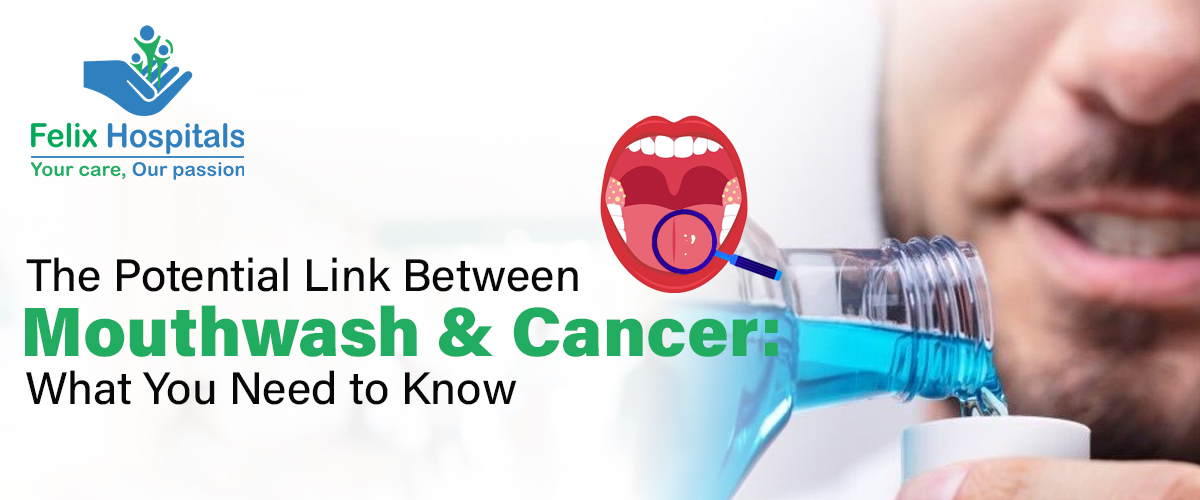
Subscribe to our

Some recent studies suggest that using mouthwash every day might increase the risk of colorectal cancer (cancer of the colon or rectum). Mouthwash contains certain chemicals like alcohol and antibacterial agents that could disrupt the good bacteria in your mouth. This disruption might have effects on other parts of the body, like the colon. Even if you have bad breath, avoid using mouthwash every day.
Felix Hospital is always available to assist you. Contact us at +919667064100.
Mouthwash is a liquid solution used to rinse the mouth, teeth, gums, and throat. It typically contains various ingredients such as antiseptics, fluoride, and antimicrobial agents designed to kill bacteria and prevent dental issues like gum disease and cavities. Many people incorporate mouthwash into their daily oral hygiene routine, believing it offers additional protection against oral health problems.
The concern arises from the presence of certain chemicals in mouthwash, such as alcohol and other antibacterial agents. Some scientists believe that these substances could disrupt the natural balance of the oral microbiome—the community of bacteria living in the mouth—which plays a crucial role in overall health. Recent studies suggest that the disruption of the oral microbiome could potentially have downstream effects on other parts of the body, including the colon.
If the link between mouthwash and colorectal cancer is confirmed, it is crucial to recognize the symptoms of colorectal cancer early. Symptoms may include:
If you experience any of these symptoms, please consult with the best cancer hospital in Noida for prompt evaluation and treatment.
If diagnosed with colorectal cancer, several treatment options are available, depending on the stage and location of the cancer, as well as the patient’s overall health. Treatment strategies may include:
If you're looking for information about the top cancer specialist in Noida, read on below:
Dr. Chinmayee Agrawal is a Medical and Hemato-oncologist with over 8 years of experience, specializing in a range of cancers and stem cell transplantation. Renowned for her meticulous care, she is committed to achieving exceptional patient outcomes and advancing her field through ongoing learning and research.
Dr. Mukta Baxi is a veteran surgeon with over 30 years of experience across multiple specialties. Her expertise includes Surgical Oncology, Thyroid and Parathyroid Surgery, Vascular Surgery, Reconstructive Oncology, Breast Cancers and Diseases, and Infertility Surgery.
Book an appointment at helpdesk@felixhospital.com. Or call at +919667064100.
The potential link between mouthwash and colorectal cancer is an emerging area of research that warrants attention. While the evidence is not yet conclusive, it is essential to stay informed and practice caution. Moderation and careful selection of mouthwash products, along with regular dental check-ups, can help mitigate potential risks. As science continues to explore this connection, staying updated with the latest research findings will be crucial for making informed decisions about oral health practices.
1.) Why do dentists say not to use mouthwash?
Dentists may caution against daily use of mouthwash, especially those containing alcohol, due to concerns that frequent use may disrupt the natural balance of bacteria in the mouth. This disruption could potentially lead to other health issues.
2.) What are the first signs of having colon cancer?
The first signs of colon cancer may include changes in bowel habits (such as diarrhea, constipation, or narrowing of the stool), rectal bleeding or blood in the stool, persistent abdominal discomfort, a feeling that the bowel does not empty completely, weakness or fatigue, and unexplained weight loss.
3.) How to avoid colorectal cancer?
To reduce the risk of colorectal cancer, you can:
4.) Does mouthwash cause health problems?
There is some concern that regular use of mouthwash, particularly those containing alcohol, may disrupt the natural oral microbiome. This disruption could potentially contribute to other health issues, although more research is needed to establish a definitive link.
5.) Who is at high risk for colon cancer?
Several factors can increase a person's risk of developing colon cancer. Individuals at higher risk typically include:
If you have one or more of these risk factors, it's important to discuss screening and prevention strategies with your healthcare provider. Screening tests can help detect colon cancer early, when treatment is most effective.